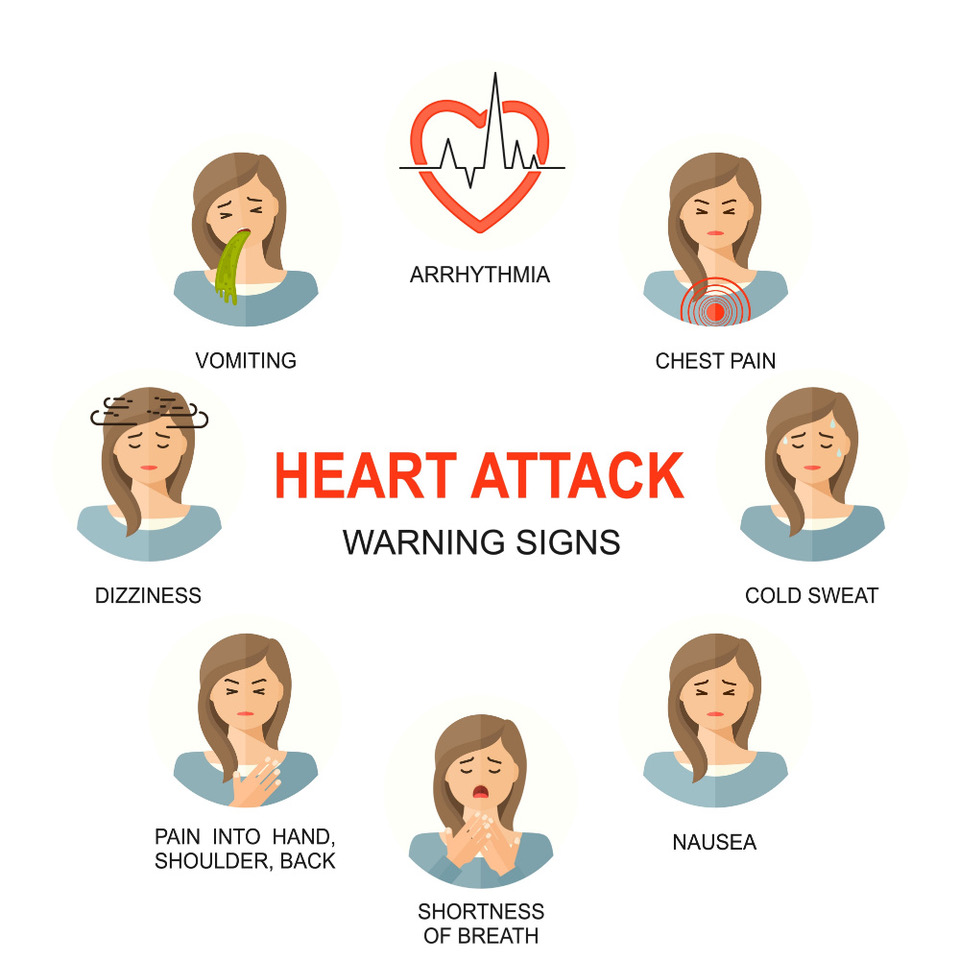What's On This Page?
ToggleThe holiday season is a time of joy and celebration for most, but unfortunately there are potential health pitfalls for those with heart conditions. According to the CDC, a person somewhere in the United States suffers a heart attack every 40 seconds!
So this season, while indulging in festive treats be careful not to stray too far from your routine.
Holidays can pose unique challenges to heart health because there is increased stress, more temptation with unhealthy foods, and colder weather. Also, the winter season puts us all into a bit of hibernation because we often take a break from our regular exercise routine.
A STUDY published in the journal called “Circulation” which belongs to the American Heart Association found that more heart attacks occur on Christmas Day than on any other day of the year. Furthermore, the second highest day for cardiac-related deaths is on December 26th.

Symptoms of a heart attack should not be ignored. It is not a “wait and see” thing like that wart on your hand! Symptoms include chest pain, pressure, squeezing sensation or feeling achy.
There may be pain or discomfort that spreads to your shoulder, arm, back, neck, mouth or tummy. You may break into a cold sweat, feel nauseated, or really weak. It might also feel like a bad burrito (ie heartburn or indigestion). Also, there may be shortness of breath or sudden dizziness.
 This uptick in heart attacks is hard to pin down on one particular reason – but we do know that the holiday brings with it a lot of heartbreak and loneliness. You may be interested to know that this same paper reported that the third most common day for heart attacks is on New Year’s Day.
This uptick in heart attacks is hard to pin down on one particular reason – but we do know that the holiday brings with it a lot of heartbreak and loneliness. You may be interested to know that this same paper reported that the third most common day for heart attacks is on New Year’s Day.
These findings underscore the need for heightened awareness and proactive measures during festive times. I know many of you reading this blog already take some of the popular medications on the market for your heart health. Your doctor may have prescribed these for you if you have a heart condition:
- Statins: Used to lower cholesterol levels.
- Beta-Blockers: Help reduce blood pressure and heart rate.
- ACE Inhibitors: Assist in relaxing blood vessels.
- Aspirin: Often recommended in low doses to prevent blood clots.
- Cardiac glycosides like digoxin which are prescribed to people for heart failure
But not all medications are helpful, some can impact the heart health in a negative way. Let’s talk about those for a minute.
Medications That May Lead to Heart Dysfunction or High Blood Pressure
There are medications that can sometimes alter heart rate or other cardiac parameters. For example, over-the-counter cough/cold medications, or NSAID analgesics. Using them once in a while in a low dose is not a problem, but sometimes people take too much, or they take it when they unknowingly have a heart problem. Talk to your physician if you have had any adverse changes in your heart function and you take an over-the-counter medication.
If you have a heart condition, read my ARTICLE which will give you tips for health wearables which are devices that can be worn. You just push a button on a necklace for example, if you have sudden symptoms of a heart attack.
But that’s not the topic today, I’m interested in helping you stay safe, and keep your heart strong and stable.
Some of the easiest things we can do include the following 5 tips for heart health:
Diet Matters
Look for meals that are high in omega-3 fatty acids and antioxidants. Incorporate fish, lean meats/protein, almonds, walnuts, brightly colored berries, and some leafy greens into holiday meals. Try to control portions so that you don’t overeat.
Physical Movement:
Engage in daily physical activities like walking, biking, dancing, yoga, skiing (whatever makes you happy). Even short bouts of exercise can help, just make sure you exercise to your own levels without overdoing it.
Control Stress:
Practice mindfulness or meditation when faced with stressful situations. Try doing some deep breathing or listening to your playlist to help you manage travel stress, airport delays, or gatherings where you have to mingle with people who stress you out. Avoid topics at the dinner table that might result in an argument.
Moderate Alcohol:
Drinking in excess could make things worse on your liver, not to mention your relationships! A good time to remind you that there isn’t enough resveratrol in red wine to improve your heart, and in fact, the free radical harm may add to cardiac burden. Furthermore, alcohol interacts with heart medications, analgesics, sleep aids, and anti-anxiety meds.
If you happen to catch a cold or flu:
Be mindful of how quickly this situation can go south. It can take a toll on your heart, so protect your immune system by making sure you sleep well, have enough vitamin D on board, and that you stay away from people who have a known illness.
See your doctor if symptoms get serious.
10 Natural Remedies for Heart Health During Holidays
- Hawthorne Berries and Leaves: Hawthorne has been traditionally used to support heart health. Both the berries and leaves are rich in antioxidants and have been shown to improve circulation, lower blood pressure, and enhance heart muscle function.
- Ubiquinol: This is the active form of Coenzyme Q10 (CoQ10), crucial for energy production in heart muscle cells. Ubiquinol supplementation is believed to improve heart function, particularly in individuals with heart conditions or those taking statins.
- Garlic (Supplements and Fresh Garlic): Garlic is renowned for its heart-healthy properties. It helps in reducing cholesterol levels, lowering blood pressure, and has anti-atherosclerotic and antithrombotic effects.
- Fennel: Fennel, with its high fiber and potassium content, can help lower cholesterol levels and maintain healthy blood pressure. It is also known for its anti-inflammatory properties.
- Omega-3 Fatty Acids (Fish Oil): Omega-3s are crucial for heart health, reducing triglycerides, lowering blood pressure, and decreasing the risk of arrhythmias.
- Magnesium: This mineral helps in maintaining a healthy heartbeat and is vital for proper muscle function, including the heart muscle.
- Potassium: Essential for blood pressure regulation, potassium helps counteract the effects of sodium and eases tension in blood vessel walls.
- Green Tea Extract: Rich in antioxidants, green tea extract can help improve blood flow and lower cholesterol.
- Flaxseed: High in omega-3 fatty acids, lignans, and fiber, flaxseed helps in reducing blood pressure and improving overall heart health.
- Red Yeast Rice: Contains compounds similar to statins and can help lower LDL cholesterol levels, though it should be used cautiously and under medical supervision due to potential side effects.
Summary
Some people pull all-nighters to cook meals, or spend excessive amounts of time dealing with life’s regular issues PLUS holiday-related stress. There are family members who you may want to see, and others who you may “have” to see, adding another layer of holiday stress that effects your heart health. Traffic is thicker and sometimes people are in a hurry. You get it… I don’t need to go on when you know all this.
So this is a time of year when heart attacks occur most frequently. Studies prove that December is the #1 month for heart attacks. This increase in heart attacks is attributed to heightened stress, poor dietary and drinking choices, and reduced physical activity, and more things which put extra pressure on heart health.
Since it is a critical month for heart attack cases, I urge you to set boundaries and take care of yourself too. Do not put yourself last on the list. Therefore, being aware of these risks is crucial during holiday celebrations. If you have a loved one who is in trouble and at risk for a heart attack, keep a close eye on him or her, and take the necessary steps to have a caregiver in place for when you cannot be there.

Suzy Cohen, has been a licensed pharmacist for over 30 years and believes the best approach to chronic illness is a combination of natural medicine and conventional. She founded her own dietary supplement company specializing in custom-formulas, some of which have patents. With a special focus on functional medicine, thyroid health and drug nutrient depletion, Suzy is the author of several related books including Thyroid Healthy, Drug Muggers, Diabetes Without Drugs, and a nationally syndicated column.

